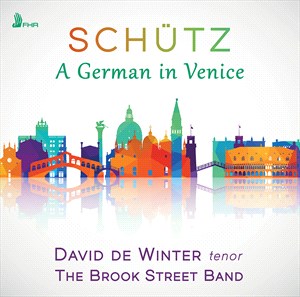

Heinrich Schütz (1585-1672): Lobet den Herrn, SWV 350 Claudio Monteverdi (1567-1643): Confitebor tibi Domine, SV 193 (from Messa a quattro voci et salmi concertati) Heinrich Schütz (1585-1672): O süßer, O freundlicher, SWV 285 Salamone Rossi (1570-1630): Sonata sopra l'aria di Ruggiero Heinrich Schütz (1585-1672): Exultavit cor meum, SWV 258 Giovanni Felice Sances (1600-1679): Stabat Mater Heinrich Schütz (1585-1672): Paratum cor meum, SWV 257 Alessandro Grandi (1586-1630): Lauda Sion Salvatorem Heinrich Schütz (1585-1672): Ich werde nicht sterben, SWV 346 Salamone Rossi (1570-1630): Sonata ottava sopra l'aria È tanto tempo hormai Heinrich Schütz (1585-1672): Cantabo Domino in vita mea, SWV 260 Francesco Cavalli (1602-1676): O quam suavis es Heinrich Schütz (1585-1672): Herr, unser Herrscher, SWV 343 Alessandro Grandi (1586-1630): Decantabat populus Israel Heinrich Schütz (1585-1672): Ich danke dir Herr, SWV 347
For many people, at least from a chronological perspective, music starts with Johann Sebastian Bach. As if nothing existed before then, or at the very least, nothing significant. As children, learning to play the piano, one of their very first encounters with "classical" music was Bach's rather simple Minuet in G, from which they progressed forward in time through Mozart, Beethoven, Schubert, Chopin and so on, but never backward. Myself being an organist, it goes without saying that the brunt of my mastery of the instrument was attained through the music of Bach, but I also discovered many fine antecedent composers like Byrd, Praetorius, Sweelinck, Frescobaldi, etc ... This new recording helps to shed light on some composers that not only preceded Bach, but also actually influenced his music.
Tenor David de Winter remarks in the booklet notes: "What struck me about these works was the Italianate nature of them, despite having been written by a German. Some of Schütz's instrumental writing and ritornelli could be lifted directly from Claudio Monteverdi himself. I suppose what attracts me to Schütz's music is the variety. It's almost as if he compiles the best aspects of the Germanic and Italian styles and fuses them together and it was unlike anything I had ever heard. He manages to be captivating, simple, theatrical, heartfelt, virtuosic, humorous, groovy and decorative, often all within the same piece."
Sort of makes you wonder why Bach himself was so phlegmatic and stoic in nature. German composer Heinrich Schütz (1585-1672), like Bach, wrote most of his music for liturgical settings. Following travels to Italy on a few occasions, and studying under Giovanni Gabrieli and Claudio Monteverdi, he must have realized that musical life could exist and flourish outside of the church. Despite most of the pieces by Schütz in this program being culled from a larger work titled Symphoniae sacrae, with texts that praise the Lord, they all exude a somewhat theatrical, almost operatic character, with melismatic embellishment thrown in here and there for good measure. Meanwhile, the strictly instrumental pieces from his Italian counterparts, add finesse (sorely lacking within German baroque music) to the program, whilst the vocal works, in particular the Stabat Mater by Giovanni Felice Sances, contribute a certain degree of gravitas to the proceedings.
David de Winter well captures and projects the innate character of each one, and the members of The Brook Street Band not only provide solid yet flexible support throughout, but are, on their own, a prime example of how a baroque music ensemble should sound. Elegance and dynamic balance throughout, a lightsome sound and gentle cadence. The recording itself, which took place in a large, open space called "The Great Barn", offers the perfect level of acoustical space and depth to the soundstage.
Jean-Yves Duperron - April 2024 Schütz - Herr, unser Herrscher